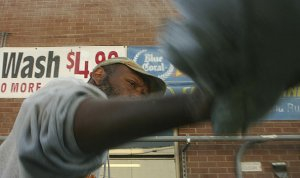Before the Nashville Homeless Power Project began investigating work conditions for homeless people, Shur Brite Car Wash workers in downtown Nashville made as little as $2 an hour. The carwashers now stand poised to sign an agreement with their employer securing up to thousands of dollars in unpaid wages for each worker—and mark a turning point in the Southern city’s struggle to organize poor workers in territory hostile to unions.
"We wanted to have a work schedule, we wanted to stop management from clocking us in and out—we wanted to be able to do it ourselves—and we wanted a break room where we can sit down off the concrete,” said Walter Jasper, who has worked at the carwash off and on for 12 years. “Recovering the minimum wages that they owed us was important, but respect and changes on the job were always more important.”
BACK WAGES WITH YOUR LEMONADE?
While much of the carwash industry has similar work conditions and is worked by immigrant workers, Shur Brite workers are overwhelmingly Black. Shur Brite is one of the few Nashville employers that doesn’t discriminate in hiring based on felony convictions. With next-to-no options for alternative employment, workers say they have stood by while the company clocked them in and out depending on whether cars were present.
Several homeless leader-activists salted Shur Brite to map the worksite. They identified and drew in four key carwashers. Quickly it became apparent that changes were needed on the job. The Shur Brite “breakroom” at the time was a microwave sitting on chemical barrels.
An organizing committee formed, and the four workers decided to focus on wages first, filing a collective lawsuit with the NHPP’s help.
The owners responded by forcing waiting workers to leave the grounds of the carwash. Workers found a tree across the street and waited there.
One June morning, NHPP leaders joined them, and set up a “Shur Brite Break Room” with tables, chairs, and lemonade. The event lasted only a few hours, until eight police officers shut it down—but not before many more workers joined the lawsuit and organizing committee.
“There was more police response to that lemonade stand than any lemonade stand I’d ever seen,” said William Miles, a homeless leader with NHPP.
With pay so low, workers churned through Shur Brite. The carwash organizing group had to find and involve ex-workers—but using traditional paid advertising and mail to reach homeless workers would have been a nightmare. The campaign spread by word-of-mouth in shelters and feeding places, and through flyering telephone poles. The workers met at a nearby fast-food restaurant and a Catholic church to prioritize their goals. As the number of Shur Brite workers involved grew to 120, they began to feel their own power and wanted more than just back wages.
MAKING IT STICK
Although workers knew they should be paid for their time on the job, they agreed that there were limitations to a private legal strategy. Lawsuits can recover unpaid wages, but cannot make an employer stop breaking the law, or make any meaningful changes to work conditions in the future.
They made a list of what they needed: a schedule, vacation days, a break room with air conditioning, heating, and a place to sit.
To enact those demands, the car-wash campaign drew from a core of students, congregations, and unions brought together around fights over the 2006 Vanderbilt University living wage and a subsequent Laborers contract.
“We realized concretely how important intentional solidarity was to winning improvements for the poorest workers in the South,” said Megan Macareg of Mid-Tennessee Jobs With Justice.
Together with the carwash workers, they took the campaign into houses of faith, soliciting letters of support from congregants across the city. They drafted a letter requesting a meeting with the owners to address worker demands, and 50 congregation members, students, and former workers delivered it June 26 with much fanfare and press in tow.
In mid-October the meeting took place. Elected workers and representatives from NHPP and the Nashville Movement, a citywide coalition for economic and racial justice, expect to work out the back-pay settlement and finalize a new employee handbook detailing on-the-job changes by mid-November.
The Nashville Movement is cementing its role as the staging ground for coordinated campaigns. It’s looking for a breakthrough in its drive among immigrant taxi drivers, who over the summer staged a mass turn-in of their electronic schedulers, had leaders fired, and shopped for a union local.
The coalition is also planning a municipal living wage campaign for later this year.







